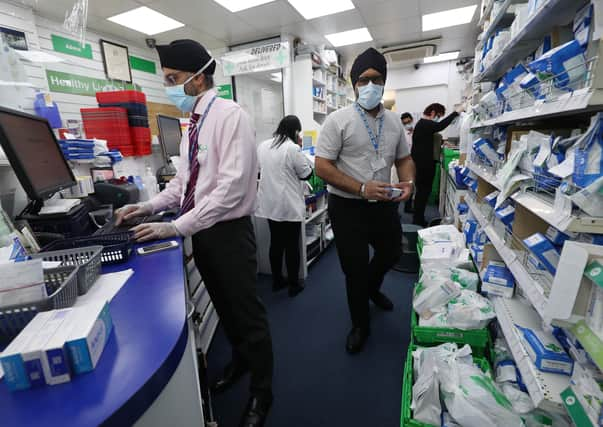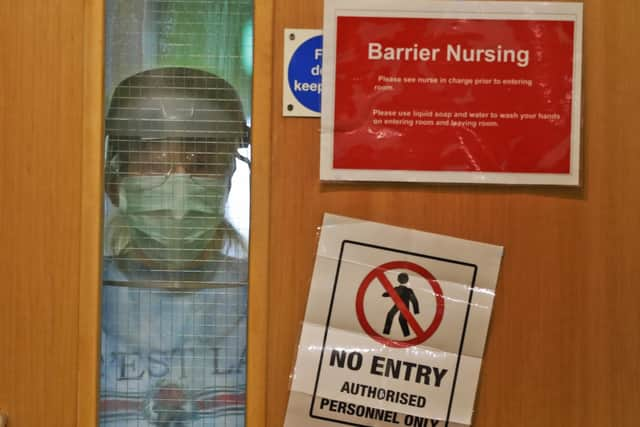How virus discriminates against our BAME communities – Dr Mohammed Ali


It soon became obvious that older people are the most vulnerable, men are more likely to be hit than women and over 90 per cent of victims have one or more underlying health conditions.
More recently the shocking death toll among BAME communities hit the headlines when figures released by the Intensive Care National Audit and Research Centre showed that 34 per cent of critically ill patients identified as minority ethnic, even though these groups make up just 14 per cent of the population.


Advertisement
Hide AdAdvertisement
Hide AdNearly twice as many Asians and four times as many black people are critically ill than would be expected if the virus really did have the same impact on everyone.
The risks are even greater for medical staff. Of course, we should expect ethnic minorities to be overrepresented among the victims when around 40 per cent of doctors and 20 per cent of nurses are BAME – but not to the extent that they account for the vast majority of health or social care workers who have died so far.
The Government and the Opposition have now set up task groups to find out why this is the case. I am relieved that they are taking this issue so seriously, but sorry that it has taken a worldwide health crisis to raise awareness that people’s ethnicity affects not only their quality of life but how long they have on Earth.
It should not have come as a surprise that those people most vulnerable to coronavirus come from communities where people have always died before their time. The single most important factor affecting your life expectancy isn’t the genes that you have inherited from your parents. It isn’t anything you can control such as switching to a healthy diet or taking more exercise. It’s how much you earn. This is an inconvenient truth that’s usually brushed under the carpet, but wander around many of our inner-city cemeteries and you cannot help but be struck by the number of premature deaths recorded on the gravestones.
Advertisement
Hide AdAdvertisement
Hide AdMany of these will belong to someone from an ethnic minority background. Half of the UK’s eight million-strong BAME population lives in the 10 per cent most deprived local authority wards. Members are more likely to be out of work, under-employed or in insecure contracts, and live in overcrowded households. These now provide ideal conditions for the virus to spread and make self-isolation well-nigh impossible.
Unable to afford the luxury of a healthy lifestyle, some ethnic minority groups are prone to conditions like high blood pressure and heart disease. South Asians are six times as likely to develop type 2 diabetes as people of European descent.
But income levels alone can’t explain why Covid-19 seems to target people from minority backgrounds. The grim reality is that a disproportionate number of those in frontline jobs who are now exposing themselves to the virus every day as they struggle to keep us alive are BAME. Many of these – such as public transport workers, taxi drivers, delivery staff and shelf stackers – are over-worked and underpaid. Nurses and care workers provide more collateral damage.
Yet not everyone in the firing line is on a low income. Almost all the doctors who have died so far are from an ethnic minority background but in the NHS, as in so many large public sector organisations, there are stark differences.
Advertisement
Hide AdAdvertisement
Hide AdLike the above average number of BAME medical practitioners working in ‘Cinderella’ disciplines like geriatrics and A&E, where they come into close contact with the public. They are less likely to rock the boat by protesting about lack of PPE equipment than their white colleagues. And several of the first victims seem to have been encouraged to come out of retirement in response to the threat of Covid-19.
I look forward to reading the findings of the Government and Labour party reviews, but I doubt they will tell us anything that we don’t know already. Action is more important than words – and that is well overdue. Yet something positive can come out of this pandemic if it forces us to address the fundamental economic and social inequalities afflicting the ethnic minority communities.
Immigrants have often been reviled as burdens on the NHS. Now they, and their descendants, are paying the ultimate price as they put their lives on the line to fight this deadly virus. Let us hope their sacrifice is not forgotten when this battle is won.
Dr Mohammed Ali OBE is a former non-executive director of Bradford and Airedale Teaching Primary Care Trust and founder of QED Foundation which promotes the social and economic advancement of disadvantaged communities.
Advertisement
Hide AdAdvertisement
Hide AdEditor’s note: first and foremost - and rarely have I written down these words with more sincerity - I hope this finds you well.
Almost certainly you are here because you value the quality and the integrity of the journalism produced by The Yorkshire Post’s journalists - almost all of which live alongside you in Yorkshire, spending the wages they earn with Yorkshire businesses - who last year took this title to the industry watchdog’s Most Trusted Newspaper in Britain accolade.
And that is why I must make an urgent request of you: as advertising revenue declines, your support becomes evermore crucial to the maintenance of the journalistic standards expected of The Yorkshire Post. If you can, safely, please buy a paper or take up a subscription. We want to continue to make you proud of Yorkshire’s National Newspaper but we are going to need your help.
Postal subscription copies can be ordered by calling 0330 4030066 or by emailing [email protected]. Vouchers, to be exchanged at retail sales outlets - our newsagents need you, too - can be subscribed to by contacting subscriptions on 0330 1235950 or by visiting www.localsubsplus.co.uk where you should select The Yorkshire Post from the list of titles available.
Advertisement
Hide AdAdvertisement
Hide AdIf you want to help right now, download our tablet app from the App / Play Stores. Every contribution you make helps to provide this county with the best regional journalism in the country.
Sincerely. Thank you.
James Mitchinson
Editor
Comment Guidelines
National World encourages reader discussion on our stories. User feedback, insights and back-and-forth exchanges add a rich layer of context to reporting. Please review our Community Guidelines before commenting.